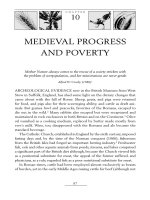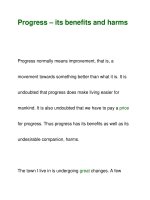Progress test03
Bạn đang xem bản rút gọn của tài liệu. Xem và tải ngay bản đầy đủ của tài liệu tại đây (223.2 KB, 6 trang )
Name _______________________________________
Class _______________________
Gold Pre-First Progress Test 3
SECTION 1: VOCABULARY
1
Complete the gaps with ONE word.
At work we are discouraged (1) ___________ throwing things away. In the past I haven’t associated big
companies (2) ___________ protecting the environment, but these days many companies try to recycle as
much as possible. However, I’m not sure (3) ___________ their reasons for doing it. I tend to think that it’s
more about the image they project rather than their desire to save the planet! Nevertheless, the world is
(4) ___________ need of all the help it can get, so I am happy to do whatever I can. But we can’t do it
(5) ___________ our own. We need to get everyone on the planet involved.
/5
2
Use the word given at the end of some of the lines to form a word that fits in the gap in the same
line.
Georgia was a really hard worker but she kept making (1) ___________ mistakes all the
CARE
time in her new job. She was just very (2) ___________ and nobody helped her when
EXPERIENCE
she started. When the boss received her (3) ___________ form for the job, he was
APPLY
impressed by her qualifications and ignored her lack of experience. He thought that
she would easily learn how to run the office. But that wasn’t the case. Georgia found it
(4) ___________ to cope with her responsibilities or learn how to run an office – there
POSSIBLE
was just too much (5) ___________ for her to take in! She was fired three months later.
INFORM
/5
PHOTOCOPIABLE © 2013 Pearson
SECTION 2: GRAMMAR
3
Complete the second sentence with between two and five words, including the word given, so
that it has a similar meaning to the first sentence.
1
‘Did you give the papers to the boss?’ she asked me.
IF
She asked me ____________________ the papers to the boss.
2
If you give me some money, I’ll do the shopping.
PROVIDED
I’ll do the shopping ____________________ me some money.
3
Jonathan at Blu Hairdressing cuts my hair.
HAVE
I ____________________ Jonathan at Blu Hairdressing.
4
David did not send that letter.
WAS
That letter ____________________.
5
‘Who do you want to see?’ he asked me.
WANTED
He asked me ____________________ to see.
6
I’ll be at work at four o’clock tomorrow, so don’t call me then.
WORKING
I ____________________ at four o’clock tomorrow, so don’t call me then.
7
‘You must meet Sarah at the airport,’ the boss told John.
HAD
The boss told ____________________ meet Sarah at the airport.
8
She will finish writing that report before noon.
HAVE
She ____________________ writing that report by noon.
9
It’s not a good idea to buy that car.
NOT
I ____________________ that car if I were you.
10
The BBC is interviewing the Prime Minister at the moment.
INTERVIEWED
The Prime Minister ____________________ the BBC at the moment.
/10
PHOTOCOPIABLE © 2013 Pearson
SECTION 3: LISTENING
4
Listen to three reviews of TV programmes related to health and complete the sentences.
1
Baked beans are good for us because they have a lot of __________.
2
Aching muscles can be helped with __________.
3
The new programme on Channel 8 is about easy __________.
4
The programme on Channel 8 also advises us on basic __________ for ourselves.
5
It’s important to know what to do with __________ injuries such as a twisted ankle.
6
The last programme is about doing exercise, keeping fit and improving __________.
7
It also offers tips on how __________ can help us keep fit.
/7
PHOTOCOPIABLE © 2013 Pearson
SECTION 4: READING
5
Read the article. For questions 1– 7 choose the answer (A, B, C or D) which you think best fits
according to the text.
My wife’s green passions!
Are you tired of being a slave to the compost bucket? Hugh Wilson explains how his wife’s passion for recycling has
taken over family life.
I put the empty jam jar into the recycling bag, turn round and it’s the look on my wife’s face that tells me I have done
something wrong. At first I try to work out what it might be. Then I suddenly catch on. Glass jars do NOT go in the
recycling bag with their lids on. I really should know that by now. My wife and I don’t argue over much, but a new threat
to family harmony has appeared. When voices are raised in our house now, it is usually about recycling or when it’s
reasonable to use the car. This is because my wife Nichola has recently turned into an enthusiastic domestic
environmentalist. She shops locally, takes the train and bus whenever possible, keeps reusable shopping bags (and never
forgets to take them to the shops) and is an expert at organising recycling.
She turns down the central heating even when it’s snowing outside, and she fills up the freezer with boxes of leftover
food. This leaves little space for the important things in life – such as ice cream! It is fair to say that I do not agree with
this. Although I am quite careful about recycling, I only use the local fruit and vegetable market instead of the
supermarket when it is convenient. I also sometimes leave the tap running while I brush my teeth. The difference in our
attitudes has become a cause of bitter argument. However, it’s comforting to know that we are not alone. According to
the New York Times, more and more couples are looking for counselling after arguments about environmental
responsibilities. Nichola and I are not in need of such relationship therapy, yet. My bottle lid error caused nothing more
than a raised eyebrow, but forgetting to take reusable bags to the shops is a more serious offence in her eyes.
One real danger topic for us is a small bin that sits on the kitchen unit where we put waste compost. The food in it goes
off quickly and it gets smelly if it isn’t emptied five times a day. Despite these drawbacks, Nichola is conscientious about
using it. Her view is – how important is a little inconvenience when you compare that with the future of the planet? I
agree with her up to a point. However, I still feel unhappy that after going to work, doing my household jobs and looking
after the children I still have to go outside with a bag of chicken bones and potato peelings. I’m not saying we shouldn’t
use the bin. I’m just saying that we don’t have to be obsessive about it.
Another area of disagreement could possibly become more serious. It’s financial. Worrying about the cost of organic
food and Fair Trade chocolate has already led to angry words and silences. My wife thinks I’d rather save money than
protect our children’s future, while I think her focus on green issues will make us bankrupt.
Still, it could be worse. One couple we know are on really bad terms. Mealtimes have become a huge problem for them
after the wife introduced meat-free days without discussing it first. Now her partner, who loves meat, simply fries a steak
or grills some chicken and puts it on top of whatever vegetarian dish his wife has prepared. Another couple we know
have fallen out over whether to sell their car and rely on public transport. He wants to get rid of it. She wants to keep it.
They still have their vehicle, but have furious arguments over its future. Counsellors believe that arguments over green
issues will only get more common and more unpleasant. Such disagreements can divide couples in a way that other
topics such as politics don’t. As for me, it is clear that I will have to learn to love the compost bin or be prepared for more
difficult times ahead.
1
When the writer puts the jam jar in the recycling bin
A his wife asks him to remove it immediately.
B he always removes the lid.
C his wife disapproves of his action.
D he immediately realises he’s made a mistake.
2
In the first paragraph, we learn that Nichola
A enjoys arguing.
B finds public transport disappointing.
C helps organise the local recycling plant.
D rarely uses the car.
PHOTOCOPIABLE © 2013 Pearson
3
Which of the following statements is true about the writer?
A He doesn’t turn the central heating on.
B He disagrees with filling the freezer with leftover food.
C He never uses a supermarket.
D He always turns the tap off when brushing his teeth.
4
How have the couple’s different attitudes affected their lives?
A Their relationship has been irreparably destroyed.
B They are going to relationship counselling.
C They often argue about things.
D The writer is now frightened of doing things incorrectly.
5
How does the writer feel about the compost bin?
A He thinks it should be emptied every day.
B He feels it should be kept outside.
C He refuses to use it.
D He feels he shouldn’t have to use it as often.
6
Nichola thinks that
A they can’t afford to buy Fair Trade food.
B her husband worries too much about money.
C money is the cause of all their arguments.
D the family will soon be bankrupt.
7
Counsellors believe that in the future
A arguments about green issues will be more frequent.
B there will be many more vegetarians.
C politicians need to provide more help for people.
D people need to be more relaxed about green issues.
/7
PHOTOCOPIABLE © 2013 Pearson
SECTION 5: WRITING
6 Complete the email with phrases from the box.
all goes well / give her / I’d really love / I’m so sorry to hear /
I’m sure / it’s good to hear / thanks for / would
Hi Sandy,
(1) __________ your email inviting me to come and stay with you in Scotland this summer. (2) __________
that you are enjoying living there, as it’s so different from London!
(3) __________ that your mother hasn’t been well. (4) __________ she is happy that you are all together now
and that you can help look after her.
(5) __________ to come and see you in your new home. (6) __________ two weeks in August be OK?
I hope (7) __________ with your mother’s continuing recovery. Please (8) __________ my love.
Love to you all,
Jessica
/8
SECTION 6: SPEAKING
7 Talk about the environment to your teacher. You should:
- say what kind of things you do to protect the environment
- say if you think governments should do more to protect the environment
- talk about some of the problems facing wild animals today
- say what you think the biggest change in the world will be in the next twenty years
Your teacher will mark your presentation using the scorecard below. The teacher circles 1 mark if you include
the area and 2 marks if you communicate it accurately and effectively. There is a maximum of eight marks.
The student:
- said what kind of things they do to protect the environment
1
2
- said if they think governments should do more to protect the environment
1
2
- talked about some of the problems facing wild animals today
1
2
- said what they think the biggest change in the world will be in the next twenty years
1
2
/8
TOTAL
PHOTOCOPIABLE © 2013 Pearson
/50









